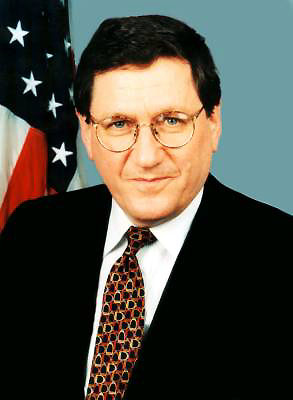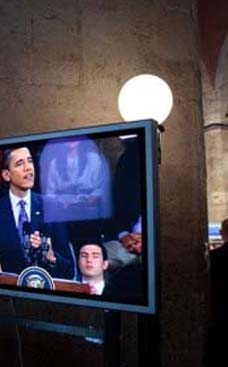
A man of voracious policy appetites and personal ambitions — The New York Times revealed he has his own personal archivist — Mr. Holbrooke thought he’d be secretary of state under a President Hillary Rodham Clinton. When she lost and then was herself surprisingly tapped for that post, he envisioned being deputy secretary. When rejected for that — he’s not a natural No. 2 — he was depressed that his grand opportunity was passing, friends say. In Pakistan, the United States has a better relationship with the democratically elected government of President Asif Ali Zardari. Mr. Holbrooke and Hillary Rodham Clinton, the secretary of state, forged a tenuous political accord with the president’s chief rival, easing tension that threatened to tear the country further apart. Mr. Holbrooke is also pushing Congress to approve $1.5 billion a year for five years in additional economic aid and separately to provide $400 million in military assistance for counterinsurgency efforts. Holbrooke watchers, of whom there are legions, are impressed. “This is a guy who refuses to lose,” said Kenneth Bacon, who worked with him as a Defense Department official in the 1990s as well as in his current post as president of Refugees International. “This is a man who has never failed,” added Wendy Chamberlin, who was ambassador to Pakistan when the Sept. 11 attacks occurred. “He has understood this is a regional crisis, that the extremism of that battleground knows no boundaries.” Richard Holbrooke, Special Representative for Afghanistan and Pakistan under the Obama administration, is a top-ranking American diplomat, magazine editor, author, professor, and investment banker who served as Country director for Peace Corps Morocco between 1970 and 1972.
Albert H. Hunt writes: Holbrooke Is the Right Man to Steer Pakistan and Afghanistan
Holbrooke Is the Right Man to Steer Pakistan and Afghanistan
By ALBERT R. HUNT
Published: May 17, 2009
WASHINGTON — A sine qua non for a successful Barack Obama presidency is a U.S. economic recovery. The foreign policy equivalent is avoiding deterioration in Pakistan and Afghanistan.
That’s a tough order. Al Qaeda and the Islamic terrorists are on the march in both countries. Afghanistan has a weak government rife with corruption; Pakistan has a military-intelligence apparatus more focused on India than the much more real threat of terrorism. It’s a country with millions of refugees, and it has nuclear weapons.
That’s just the sort of assignment Richard C. Holbrooke relishes. Mr. Holbrooke is the U.S. special representative for Afghanistan and Pakistan. For all the urgency of those two places, don’t for a moment think he’ll be limited by geographical boundaries.
To his admirers, Mr. Holbrooke, who brokered the Dayton peace accords in 1995 and then was U.S. ambassador to the United Nations, is a brilliant strategic thinker and a relentlessly effective diplomat. To his detractors, he’s a self-promoting, arrogant egomaniac.
He’ll need it all in his current post.
Mr. Holbrooke, 68, who calls this his “most impossible job,” thinks progress has been made in the troubled region. “We spent the first two months in a strategic review and had to make decisions not acted on by the previous administration,” he says. “We think we’ve gotten our own house in order and begun to address the situation on the ground.”
Certainly, he has helped end the drift of the George W. Bush years. In Afghanistan, the United States has scaled back its political objectives even as it has intensified its military involvement, committing 17,000 more combat troops, installing a new American military commander and beefing up training for the Afghan military and police forces.
In Pakistan, the United States has a better relationship with the democratically elected government of President Asif Ali Zardari. Mr. Holbrooke and Hillary Rodham Clinton, the secretary of state, forged a tenuous political accord with the president’s chief rival, easing tension that threatened to tear the country further apart. Mr. Holbrooke is also pushing Congress to approve $1.5 billion a year for five years in additional economic aid and separately to provide $400 million in military assistance for counterinsurgency efforts.
While this is very much a regional problem that includes India, the most important challenge by far is Pakistan and reshaping its military and intelligence machines.
In this pursuit, no one could be more aggressive than Mr. Holbrooke. At a South Asian conference in Tokyo a few weeks ago, he scheduled a late-night, 15-minute conference with Mr. Zardari. The U.S. envoy stayed four hours, leaving after 2 a.m.
Holbrooke watchers, of whom there are legions, are impressed. “This is a guy who refuses to lose,” said Kenneth Bacon, who worked with him as a Defense Department official in the 1990s as well as in his current post as president of Refugees International.
“This is a man who has never failed,” added Wendy Chamberlin, who was ambassador to Pakistan when the Sept. 11 attacks occurred. “He has understood this is a regional crisis, that the extremism of that battleground knows no boundaries.”
Pakistani and Afghan officials say that on his trips there in the past four months, he’s listened as well as lectured.
Mr. Bacon dismisses criticism that the diplomat is manipulative, even a bully: “No one is more skillful at finding the corners. When he is described as thuggish, look at the people he has to deal with, like Milosevic,” he said, referring to the former Serbian leader. “Holbrooke is properly tough and properly aggressive.”
He hasn’t been shy about pressuring the new Pakistani president, the widower of the slain leader Benazir Bhutto. Out of that has come a bond of sorts. “Holbrooke is a godsend,” Mr. Zardari said.
A man of voracious policy appetites and personal ambitions — The New York Times revealed he has his own personal archivist — Mr. Holbrooke thought he’d be secretary of state under a President Hillary Rodham Clinton. When she lost and then was herself surprisingly tapped for that post, he envisioned being deputy secretary. When rejected for that — he’s not a natural No. 2 — he was depressed that his grand opportunity was passing, friends say.
With the Pakistan-Afghanistan assignment, he was reborn and has worked his unsurpassed network to assemble the concerted effort that eluded the Bush administration. He persuaded Frank Ricciardone, a former ambassador to Egypt, to become deputy ambassador in Kabul.
There are Holbrooke allies everywhere. In addition to his growing Af-Pak team, the new ambassador to Iraq, Christopher R. Hill; the deputy White House national security adviser, Thomas E. Donilon; and Tony Blinken, the vice president’s chief foreign policy adviser, are acolytes.
There are critics. Last week on Capitol Hill, Democrats like Senator Robert Menendez of New Jersey and David Obey, the House Appropriations Committee chairman, joined Republicans in questioning American involvement in the region. Fifty-one House Democrats voted against Mr. Obama’s war-funding request.
Richard N. Haass, president of the Council on Foreign Relations, worries that the situation in Pakistan is getting worse. “It’s quite possible at some point over the next few years we’ll have to deal with a Pakistani state that essentially can’t govern,” said Mr. Haass, a Holbrooke admirer. He expressed concern that the special envoy’s policies may lead the United States to “become a participant in Afghanistan’s civil war,” saying his goals may have to be scaled back.
Scaling back doesn’t come easily to Mr. Holbrooke. Over the past 10 days, he has assembled all the top Pakistani and Afghan government leaders — some of whom had never met one another — in Washington; played host to the presidents of the two countries at his home; conducted marathon sessions on Capitol Hill; discussed the issue with Mr. Obama and Mrs. Clinton — Mr. Holbrooke has a genuinely close relationship with her; had dinner with Vice President Joseph R. Biden Jr.; and took off for a trip to Germany, Turkey, Greece and Saudi Arabia to discuss Afghanistan, and Pakistani refugees.
In between, he found time to discuss Afghanistan over lunch with the actress Natalie Portman.
Albert R. Hunt is a columnist for Bloomberg News.











